I’ve been hearing about translational medicine for a long time and wondering what it was. For the most part, it’s a huge subsidy to pharma for more drug development, but there is a section of it that is focused on approaches that would help us like preventative medicine, community work, and comparative research. If we get loud enough as advocates we can make this community part much larger. What’s even more exciting is that those of us with scientific backgrounds can now do our own research, and we have many competitive advantages over existing research departments.
Currently, translational medicine, at least in the mental health field, is a gigantic waste of taxpayer money. However, two simple action points can make it help our people instead of harming them. 1) Advocate effectively for better approaches. 2) Start doing the research ourselves. This blog is about how I’ve found those approaches and how we can start fixing this situation.
My local translational medicine conference
A couple of months ago I was going through my local community events to fill my calendar as I do every couple of weeks. I try to stay on top on Kansas City’s community development, transit advocacy, education, networking, and business strategy events. And of course the bike parties and hip hop events that make my life fun. Lots of people tell me, “I want to start a business like you,” so I tell them to start going to the tons of free events and free classes out there in every community. Once someone has gone to enough events, they can always count on finding someone they know at the other ones.
I look through my Facebook event invites, suggested Facebook events that I haven’t yet been invited to, the local library calendar, a Twitter list I have set up to collect people who host good events, and also the local small business resource center. Most cities have a small business development organization funded by the federal government. Ours is called Kansas City Sourcelink and this time they had a Translational Medicine Conference listed here in town.
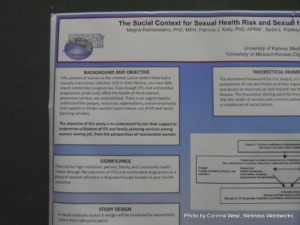
I went to the conference despite being on deadline for a big grant. I started talking to people. It turned out one of the organizers was from the Bible Study group at the church I used to go to. She said, “Tell me why you’re here and I’ll introduce you to whoever you need to talk to.”
I said, “Well, I’ve been hearing all about this translational medicine for a long time so I came to find out what it’s all about.” I’ve been talking to MindFreedom for years wondering how we could get NIMH to have more of our input, and instead NIMH keeps hyping this “new approach.” My favorite blogger, 1boringoldman.com has been pretty critical of the direction NIMH is heading. Here is his summary, from a series called “Psychopharmacological Evangelism.”
In psychiatry, the pharmaceutical industry is suddenly no longer the cash cow for biological psychiatry. PHARMA’s now being cast as among the ranks of the oppressed, strapped by the stringent unreasonable requirements of the F.D.A., in need of relief and special treatment. So translational neuroscience and the government funded translational centers are basically focused on new drug development, pulling out all stops. The drug companies are turning over their databases on the many compounds they’ve studied. The Transitional Centers are pouring over previously rejected compounds to give them a second look. The N.I.M.H. is working on a new psychiatric diagnostic scheme [the RDoC] based on neuroscience parameters to further brain and drug research. They’re trying to streamline drug assays with tissue chips. Dr. Insel is blogging about something he calls Experimental Medicine aimed at more quickly screening compounds [skipping the rats]. They’re pulling out all stops to refill the pipeline, taking over drug development, planning to feed the compounds to PHARMA for production. So in response to the perceived crisis, “Damn the Torpedos! Full Speed Ahead!”
What does transitional neuroscience mean in this new incarnation? Pardon my cynicism, but it means just about anything that leads to new drug development. It’s the Manhattan Project of psychopharmacology. It’s NASA after Sputnik. And it’s something that the highly motivated pharmaceutical industry couldn’t bring off with billions of dollars in resources and years of experience now being attempted with only millions of dollars in government funding. I expect you can guess what I think about this crisis driven forced march with Tom Insel at the helm….. It’s a piece of a new and desperate collective psychopharmacological evangelism…
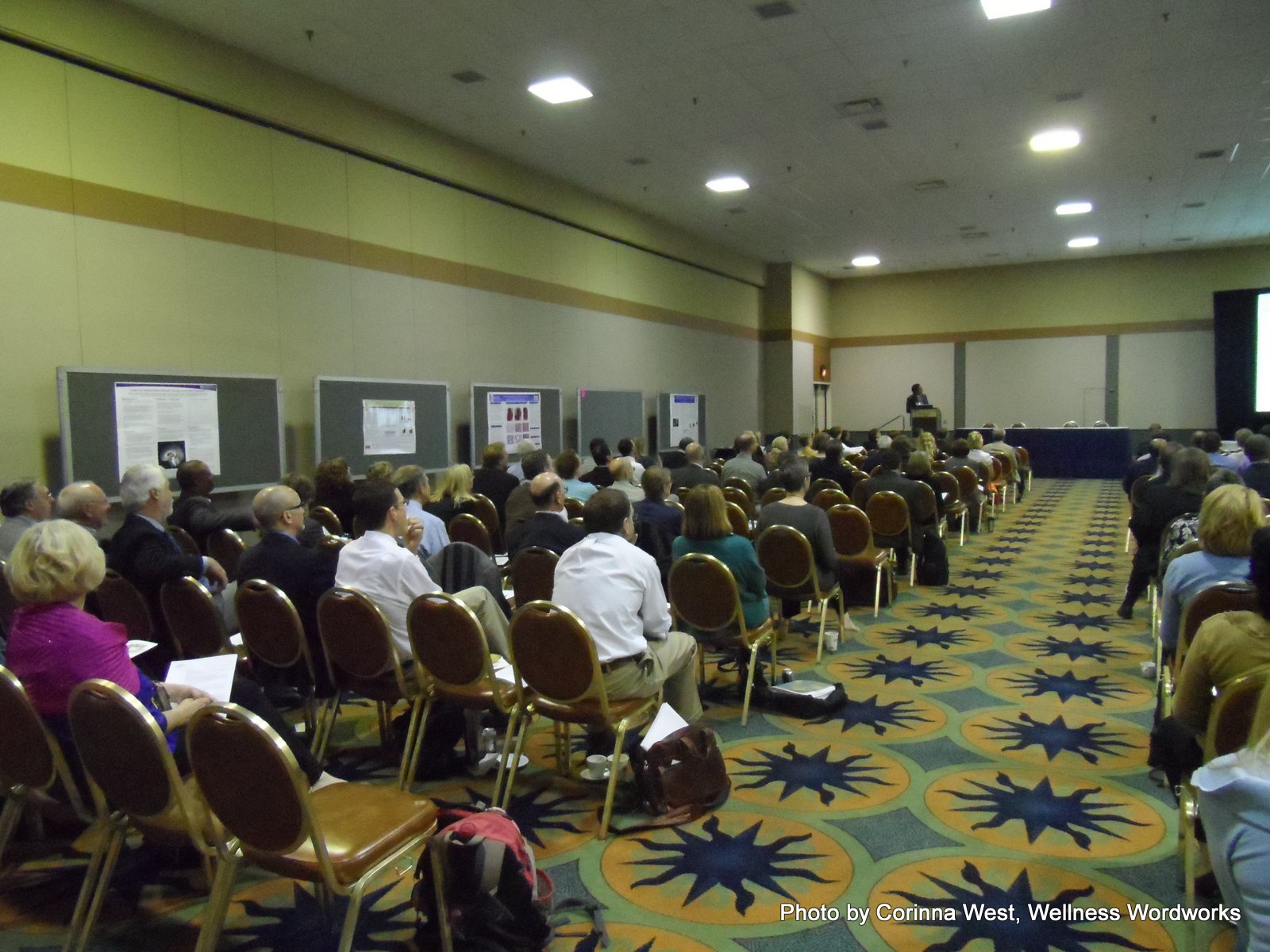
I got to the conference in the morning and was amazed at the size of the event. There was about 130 people, all from the Kansas City metro area. It turned out this conference was hosted by an organization called Frontiers, which is one of about 60 Translational Medicine Organizationsacross the country. If you consider that each of those 130 people all draw a $70,000 – $150,000 salary mostly paid by government funds, and multiply by the 60 organizations across the country, you can start to realize how much our government spends on “basic science.”
How researchers and mainstream mental health people are frozen and immobile
So I went around the rest of the day, listening to talks, and talking to researchers. I asked them, “What did you think of Dr. Butte’s talk? He said you academics are all obsolete, what do you think, what are you going to do about it?” I might phrased it a bit gentler, a bit smoother and more circumspect, but that was the gist of my question.
About ten people answered. All of them had some kind of variation on, “I know. He’s right. But I have no idea what to do about it.”
It reminded me so much of what I hear from disease model mental health advocates who think the solution to mental illness in our country is more labels and medications and “stigma reduction.” They have been super sad about all the budget cuts that reduce the number of people they can “help,” and the budget cuts have been so disheartening that many have been unable to think of new directions to move. Eventually I realized that if current “treatment” often does more harm than good, then budget cuts weren’t really a problem. I came up with the “Please Cut Our Budgets” campaign that scared the hell out of mental health providers but so far has gotten a great reception from psychiatric survivors. This is a poem I wrote about how I figured my own way to move past that immobility and frozeness:
How we can impact the direction of translational medicine:
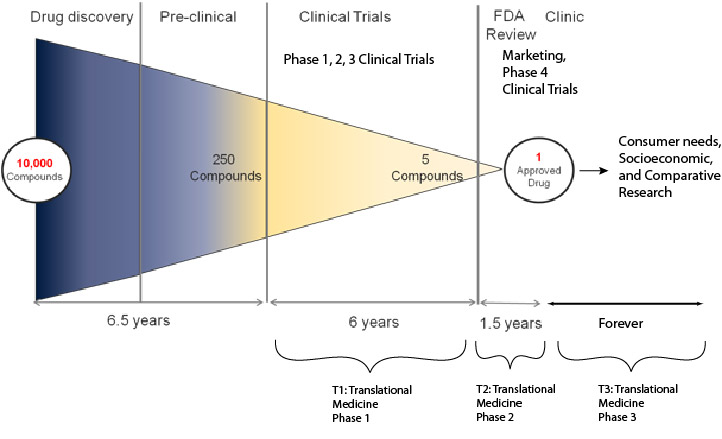
What it turns out is that there is a spot in translational medicine for stuff that actually helps those of us with mental health labels, or helps prevent us from getting those kind of labels. This is shown on the far right hand side of the chart. So during this conference I asked my church friend who turns out to be a VIP in the local science community to hook me up with the right person to increase this particular sector of research.
I was introduced to Kim Kimminau, the Frontiers Director of Community Health Research, or at least she does this for a small portion of her time. I asked to be invited to meetings or grant review panels or public input sessions. I asked to give input on the Frontier’s mental health agenda. After months of emails, I finally figured out that the organization actually has very little budget for community engagement, has no current mental health projects, and has no mechanism at all for community input. Also, if we were to give input, they don’t have a way to fund the kind of research that we would need.
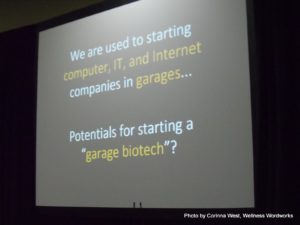
Dr. Kimminau told me “It’s a matter of getting the most health to the most people for the least amount of money – there’s not funding for that.” For instance, in Africa the low hanging fruit in health are Vitamin deficiencies, vaccinations, clean drinking water, and AIDS prevention. Addressing these problems has the most impact, it gives the largest amount of people better health outcomes for the least amount of money. In developed countries, the low hanging fruit is stress reduction, exercise, and obesity. Addressing these problems gives the most health impact for the least amount of money. Other pressure points in the US are checklists to reduce medical errors, reducing tests that lead to unnecessary medical care, and prevention in general instead of treatment.
However, in our community, amongst those of us labeled with mental health issues, we have different pressure points, as we often talk about on this blog. Many of know the story of how psych meds help some people, but hurt others, and may be increasing disability in our country. We know how the labels themselves have hurt our brothers and sisters. We know that helping finding safe medication withdrawal protocols, safe places for people in crisis to be, or ways to handle temporary emotional distress without permanent labels would make a much bigger difference. Beyond Meds did a beautiful piece about how SAMHSA’s Wellness approach is completely ineffective when we ignore the root problems causing our community’s poor health.
However most academic researchers like the people at this conference, have no idea of this story. They have no comprehension of the lack of evidence for long term medication effectiveness. I asked a question during the panel discussion at this conference and the keynote speaker admitted she didn’t even think it was possible to exit the mental health system except maybe by losing your health insurance.
So we need to talk to these people. But how? I pounded against a wall for three months to find out that my local group wasn’t able or ready to hear me. Next week in D.C. is a national conference of all the 60 local translational medicine groups about how they can increase community input, but has our community been invited? Not that I know of, since as far as I can tell, they don’t even know about our community. I have an email in the conference director to see if they can at least find some spots for our advocates who live in the DC area who wouldn’t need a last minute plane ticket. We’ll see what happens with that. I also have follow up emails in to my friends at SAMHSA and HHS who theoretically are above these groups to see if they can help us out. So if you live in the DC area, be primed for an email from me to see if you are free Aug 23 – 24, this Thursday and Friday. We need as many bodies there as possible.
And in the meantime, since they may never be able to hear us, we can do our own research. Atul Butte has explained how we no longer need a research lab, or research grants, or a degree. We can do our own complex, rigorous, competitive scientific investigations. Basically, we can mine public databases to find ideas of interest, get samples from public source, send the samples to contract labs for testing, and prepare the results all from our own homes. If you, like me, got sucked out of your science career into the black hole of mental health labels, now you too, can be a full time researcher. We have many competitive advantages: not needing to maintain a $70,000 to $150,000 lifestyle like the existing researchers, not needing to give 40% of our research funding to our host academic institution as “overhead,” not having to spent part of our time teaching, and not being hindered by preconceptions and ego. Every field needs an amateur. And 10 reasons survivors might know more science than professionals.
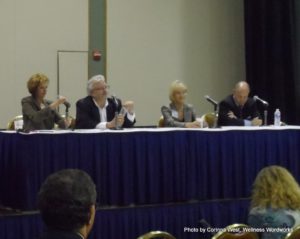
So, think about the science questions you’ve wanted answered, the research that we think really needs to be done. Then put together a project to post on Kickstarter or Indigogo.com or another crowdfunding platform to get the money. Then start in the databases. We can take back our science, take control back from the obselete academicians, the hopeless disease mongering advocates, and the mental health providers who have faced so many budget cuts they’ve lost heart.
We know the powerful message that people do recover completely, we know that escape is possible. Let’s spread the word and expand the evidence base on how this can happen. My friend and bridesmaid at my wedding this year was Priscilla Ridgeway, who said, “Lot’s of advocates say, ‘We are the evidence’ but we need the research publications to back that statement up. Our research field is VERY thin.” So this is how you and I can make it stronger, to reflect our true hope and passion and the beauty of the lives that we’ve rebuilt.
Ongoing news update (MONDAY – Aug 20):
I asked the The conference director for the national translational medicine conference if they had invited mental health community members. She said, “Oh, we definitely want community members there. We invited Thomas Insel from NIMH and we thought that would cover it. But we’d love to have you and we’ll give you the student rate for conference registration.”
So we now need 5 bodies to attend this conference and 5 x $75 for registration plus possibly stipend or travel expenses for advocates to attend. Bob Whitaker agreed to donate one of the registration amounts. We also now have Shawn Terrell from HHS looking into getting us scholarships. Please email or FB message me or call or text me if you can help with either. You can also use the Pay Pal Donate Button on my website, and I will get the funding to other advocates.

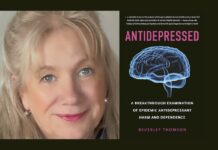












Great post in every way! I like your hands on, practical approach. Let’s stop moaning and let’s get on with it. Let’s meet the “experts” on their own turf.
Report comment
Great article, Corinna. Your energy is impressive.
What I see at the far right of the chart (“1 Approved Drug”) is marketing. I’m sure everyone in Translational Medicine would agree there’s a place for the community in that!
I believe one of the reasons universities are excited about participating in Translational Medicine — aside from whatever government grants they can get — is that in exchange for doing the grunt work for pharma, they’re going to get royalties from that one drug that pans out.
(Translational Medicine was invented by universities in partnership with pharma. Universities needed funding to support their scientific faculties; pharma needed to get other bodies to take the risk for tedious basic research. Together, they lobby governments to cough up the grants for pharma drug development in the guise of pure research uncontaminated by commercial interests. Pharma has every intention of swooping in and buying promising drugs to make the big bucks with less outlay.)
Since the goal of Translational Medicine is to produce drugs with commercial potential, I’m not seeing the same opening Corinna does for patient interest groups.
I see more opportunity in the WRAP studies http://www.madinamerica.com/2012/06/wrap-reduces-depression-and-anxiety-improves-recovery/ Patient-Centered Outcomes Research Institute (PCORI) http://www.nejm.org/doi/full/10.1056/NEJMp1207437 and “practice-based evidence” http://www.madinamerica.com/2012/06/plos-medicine-announces-series-on-practice-based-evidence-from-around-the-world/
The idea of research as a cottage industry is very interesting.
Report comment
very informative commentary. Good luck on your research.
Report comment
Thank you Corinna for linking to my blog, much appreciated!
Report comment
Terrific article. Your attitude is inspiring! I wish there were about a million of you 😉 Then, we would get some things done and like my mom says, ‘We’d get it done right’
Thank you Corinna.
Report comment
It would have been helpful to the lay reader if you had defined “translational medicine” up front. Don’t assume your non-scientific researchers are familiar with the term. And doing our own research is not a new idea; in fact, there have been psychiatric survivors around the world doing research for the last 25+ years at least, people like Jean Campbell, Jeanne Dumont, Janet Wallcraft, Jasna Russo, and on and on, and more than 20 years ago there was a National Consumer/ Survivor Research and Policy Workgroup that advised SAMHSA and its predecessors. It’s important to acknowledge our history.
Report comment
Yes, Emma, you are right. I thought I defined it by saying, “it’s a huge subsidy to pharma and a waster of taxpayer money.”
But I should also have said, “It’s theoretically taking research data and shepherding it all the way to clinical applications so it actually helps people with health concerns – the ‘translation’ from research into practice.”
My researcher friend told me that most researchers define it as, “A sexy way that helps me get grants to describe the same exact research that I’ve been doing all along.”
Report comment
Corinna, while browsing my Twitter feed, just now, I ran across a link to the following abstract (which could – hopefully – encourage psychiatric survivors, perhaps, interested in your post, on “…Take Back Translational Medicine”):
Why are modern scientists so dull? How science selects for perseverance and sociability at the expense of intelligence and creativity.
Authors
Charlton BG.
Journal
Med Hypotheses. 2009 Mar;72(3):237-43. Epub 2008 Dec 12.
Affiliation
Abstract
QUESTION: why are so many leading modern scientists so dull and lacking in scientific ambition? ANSWER: because the science selection process ruthlessly weeds-out interesting and imaginative people. At each level in education, training and career progression there is a tendency to exclude smart and creative people by preferring Conscientious and Agreeable people. The progressive lengthening of scientific training and the reduced independence of career scientists have tended to deter vocational ‘revolutionary’ scientists in favour of industrious and socially adept individuals better suited to incremental ‘normal’ science. High general intelligence (IQ) is required for revolutionary science. But educational attainment depends on a combination of intelligence and the personality trait of Conscientiousness; and these attributes do not correlate closely. Therefore elite scientific institutions seeking potential revolutionary scientists need to use IQ tests as well as examination results to pick-out high IQ ‘under-achievers’. As well as high IQ, revolutionary science requires high creativity. Creativity is probably associated with moderately high levels of Eysenck’s personality trait of ‘Psychoticism’. Psychoticism combines qualities such as selfishness, independence from group norms, impulsivity and sensation-seeking; with a style of cognition that involves fluent, associative and rapid production of many ideas. But modern science selects for high Conscientiousness and high Agreeableness; therefore it enforces low Psychoticism and low creativity. Yet my counter-proposal to select elite revolutionary scientists on the basis of high IQ and moderately high Psychoticism may sound like a recipe for disaster, since resembles a formula for choosing gifted charlatans and confidence tricksters. A further vital ingredient is therefore necessary: devotion to the transcendental value of Truth. Elite revolutionary science should therefore be a place that welcomes brilliant, impulsive, inspired, antisocial oddballs – so long as they are also dedicated truth-seekers.
http://www.ncbi.nlm.nih.gov/m/pubmed/19070437/?i=5&from=/22577304/related
Report comment
Hence the importance of the “Unschooling” movement or this chance I described in the blog for freelance research careers.
I’ve tried to talk about four friends out of grad school already. Some success, some not. People think school is still the path to good life instead of the path to heavy student loan debt, irrelevant indoctrination, abuse from status quo adherents, and jobs that suck anyway.
Report comment
I also want to comment that this turned into a major advocacy victory where now people from NIMH are wanting to dialogue with me. The local people also contacted me and told me they put a new person on community stuff and “Can we please have a meeting next week?”
I may blog about this more soon.
Report comment